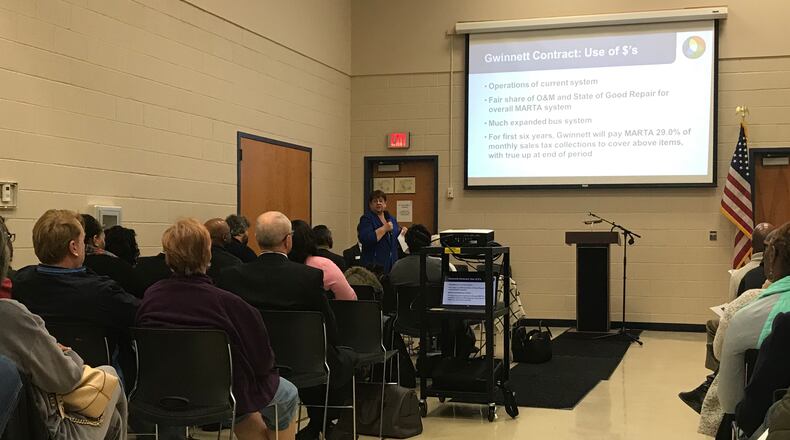There was no fire, there was no fury; no outrage and no acrimony.
The location of Wednesday night's town hall meeting — the Centerville Community Center, in the heart of deeply diverse and largely Democratic south Gwinnett — undoubtedly had something to do with it. But the shortage of negativity among the 100-plus folks gathered to discuss Gwinnett County's upcoming MARTA referendum marked an auspicious start for those hoping the vote will pass.
VIDEO: Previous coverage of this issue
“It's great to see this much interest in a topic that obviously involves a big decision for the county,” said Gwinnett Commission Chairman Charlotte Nash, who presented information about the March referendum at Wednesday’s meeting.
“The more people that come out to these kind of events and actually take a look at things in detail, the more informed the folks that go to vote are going to be.”
Wednesday's event, which was sponsored by state Rep. Dar'shun Kendrick and other leaders representing the area, was among the first formal events in which Nash and others officials have presented information regarding the March 19 vote. As many as a dozen information sessions are expected to be held by the county, and Nash has vowed to attend any other community meetings that she's invited to.
An advocacy group called Go Gwinnett is also expected to hold its own meetings as part of its pro-transit campaign.
Schedules have not yet been released for the county events or those of the advocacy group.
On Wednesday, Nash was joined by county transportation director Alan Chapman and MARTA representative Colleen Kiernan. Restricted from openly advocating one way or another (government representatives cannot use taxpayer dollars to push for or against a public referendum), their presentations stuck to the basics.
If the referendum succeeds, it would ratify Gwinnett's pending contract with MARTA for transit services and opt residents into paying a new 1 percent sales tax until 2057. Those funds would pay for a historic expansion of transit service in Gwinnett, including a heavy rail extension from Doraville to the Norcross area.
A dozen or so members of the public spoke following Wednesday’s presentations. Many had laudatory words.
The few who expressed negative thoughts weren’t against the referendum, per se — but wished the offerings in the county’s transit plan were even more extensive.
“I would have a much better feeling, giving 1 percent of my income back to the county if it wasn't going ... to fund buses, which is more of an antique way of moving people,” said Ron Weber, a 38-year resident of the Snellville area.
“What’s going to make people ride the bus? If we were gonna put rail service down to Centerville, awesome. But it’s not gonna happen.”
The transit plan (which can be viewed in full below) does include a greatly expanded local bus system. It also includes the possibility of new routes from the Snellville area to DeKalb County's closest MARTA station eventually being converted to a "bus rapid transit" line, which operates in dedicated lanes and has fewer stops.
“It really provides a lot of the same features as light rail,” Chapman, the transportation director, said. “But probably at about a fourth or a fifth of the cost.”
Nash said she wasn’t surprised that the main gripe Wednesday night was about more service, not less.
“We’ve talked internally that that is the challenge, that the appetite for transit is bigger than the ability to deliver within reasonable dollar figures,” she said.
That’s certainly a change from the county’s past.
Gwinnett voters have twice rejected joining MARTA, with the last referendum held in 1990.
The county has grown exponentially since then, in both population and diversity. More than 60 percent of Gwinnett’s 920,000 residents are now black, Latino or Asian.
The county also has seen a dramatic shift from the Republican Party toward Democrats, which are generally more likely to support public transit. Gwinnett voters overwhelmingly chose Democrat Stacey Abrams in November's race for Georgia governor, and the county's delegation to the state legislature is now a majority Democrats.
“I am glad [transit] is finally on the ballot,” said Kendrick, D-Lithonia, said Wednesday. “And I think by the numbers you see that it is one of the most important issues that we’re going to have to face here.”
Nash said that early voting for the March 19 referendum will start on Feb. 25. She said the full schedule is expected to be adopted next week by the county’s elections board.
About the Author
Keep Reading
The Latest
Featured



